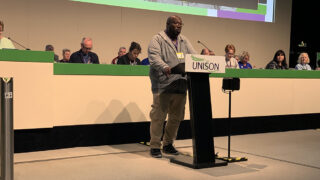UNISON believes public services should be run for people, not for profit.
Privatisation costs more in the long term, damages the services people rely on and drives down the terms and conditions of those providing them.
That is why UNISON is campaigning against the privatisation of local services.
UNISON believes public services should be run for people, not for profit.
Privatisation costs more in the long term, damages services and drives down terms and conditions.
Privatisation costs more
The current outsourced market for public services already has an annual turnover of £82bn but this is growing all the time.
The government says privatisation saves money, but we know this isn’t true.
Did you know?
We will pay £217bn in “user charges” for private finance initiative facilities between now and 2033, but direct public ownership would be £3bn a year cheaper.
For example:
- £137,000 was overpaid by Calderdale council to one provider of homecare and meals on wheels last year – auditors fear much more has been wasted;
- £10m a year has been paid in excessive fees by Liverpool council on its long-term partnership with BT, according to an internal report on overcharging;
- £9bn has been paid in total cost overruns on 105 outsourced IT contracts in central and local government, the NHS and other public bodies since the 1980s;
- £20bn is being paid in extra borrowing costs for the 700 projects that successive governments have acquired under the PFI.
Taxpayers will pay £217bn in “user charges” for private finance initiative facilities between now and 2033, but direct public ownership would be £3bn a year cheaper.
Every year, £4.6bn is spent by central and local government on the procurement exercises needed to award the private contracts they’re entering into.
Privatisation damages services
We know that people delivering public services who are employed by community and voluntary sector organisations or private companies remain committed to the public service ethos.
However, we also know that commercial considerations make this more difficult: official data has shown that profit-making care homes and domiciliary care services are less likely to meet minimum regulatory standards on service quality.
Privatisation drives down terms and conditions
When companies compete for public sector contracts they’re mainly doing so on price – and their main cost is paying their workforce.
So the way they can make the lowest bid is often by slashing their staff’s terms and conditions.
But as Zoe Williams reported in The Guardian, this doesn’t apply to these companies’ chief executives: “Serco, which receives over 90% of its business from the public sector, paid Christopher Hyman an estimated £3,149,950 in 2010.
“This is six times more than the highest paid UK public servant and 11 times more than the highest paid UK local authority CEO.”
When services are privatised everyone suffers, service quality declines, workforce conditions are eroded and equality considerations take a back seat.
Heather Wakefield, UNISON head of local government
Real stories
Ann-Marie Black
from Swindon
It’s an absolute disgrace. It could be as many as 64 of us lose our jobs if the council outsources our care workers.
“There’s been no consultation with frontline staff, they didn’t ask us what we thought: they just announced at the beginning of the month that our jobs are to be axed.
“Most of the people we care for have been crying, and we have been crying with them. We put our hearts and souls into the work.
“Everybody is absolutely heartbroken at the situation.
“They are people who have had their needs assessed by a social worker and tend to be complex cases. They see us every day – in some cases, we’ve looked after their mothers and fathers.
“They see us as friends. We have to do very personal things like wash their private bits – you can’t do this unless they trust you.
“We will battle right until the last.”
John Stevenson
from Edinburgh
Edinburgh council voting against privatisation is the best outcome we could have got.
“UNISON has been campaigning to keep these services in-house for three reasons.
“Firstly because we think it is the right thing to do. We think it is right that quality public services are delivered by a public service team directly accountable to the people of Edinburgh through their elected councillors.
“We think it is right that our taxes should go directly to services, to the people who deliver them and the people who rely on them, rather than to profits and shareholders.
“Secondly, because we believe that the public-sector comparators – the in-house options – have risen to the challenge and will deliver not only best value but a continuing commitment to public services in Edinburgh.
“And thirdly, because we believe that it is right that the council should show trust, confidence and respect in its own workforce.
“At the beginning of the process, the council made it clear that there would have to be a compelling case for privatisation.
“We clearly believe that a compelling case has not been made for privatisation and we believe we have consistently provided compelling and credible analysis and evidence to show that.
“The unions and council employees have put enormous work into this process.
“We have shown in detail that the in-house options have been realistic, fair and efficient – but most of all workable – especially if we have a level playing field and like is compared with like.”
Success stories
Stopping sell-offs in Aberdeen
Aberdeen City branch successfully campaigned to stop the privatisation of corporate governance services.The council had been looking at a so-called “alternative delivery method – ie selling off – for services such as finance, human resources, customer care, ICT, benefits and regulations. But eventually it voted to keep the services in-house.Branch secretary Karen Davidson said: “These services will now remain in-house, where committed and dedicated council staff can provide the best service for the citizens of Aberdeen.”The branch campaigned hard for 18 months for this outcome,” she added. “We are sure that the councillors who voted in favour of in-house staff recognise the excellent service our members provide.”
Back in house on the Tyne
Recycling collection at North Tyneside Council was delivered by an external contractor.
There were issues about the service quality and when the contract expired, the authority decided to seek a new service while extending the existing contract for two years to allow time to redesign, procure and implement the new service.
It assessed a range of options, and decided to bring the service back in house – this meant it could be integrated with refuse collection, which was delivered by the council’s own Clean Neighbourhoods team.
The insourcing was completed on budget and ahead of schedule.
The authority now provides directly delivered integrated weekly refuse collection and fortnightly recycling. Carrying out recycling alongside refuse collection increased efficiency and improved the service.
There was an 18% increase in resident satisfaction and public participation in recycling has increased from 50% to 94%.
A total of 22 employees who worked for the external contractor were transferred to North Tyneside’s Clean Neighbourhoods team under TUPE regulations.
Staff all opted to change to the council’s terms and conditions, which include sick pay.




